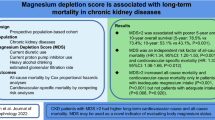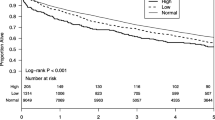Abstract
Background
Magnesium deficiency is associated with various health conditions, but its impact on the progression of chronic kidney disease (CKD) remains unclear. This study aimed to investigate the association between serum magnesium levels and prognosis of renal function in CKD patients.
Methods
This is an analysis of the Japan Chronic Kidney Disease Database Ex (J-CKD-DB-Ex), which is a multicenter prospective cohort including CKD patients enrolled from January 1, 2014 to December 31, 2020. We included adult outpatients with CKD stage G3 and G4 at the time of initial magnesium measurement. Patients were classified by magnesium levels as low (<1.7 mg/dl), normal (1.7–2.6 mg/dl), or high (>2.6 mg/dl). The primary outcomes were the composite of an eGFR < 15 ml/min/1.73 m2 or a ≥30% reduction in eGFR from the initial measurement, which was defined as CKD progression. We applied the Kaplan–Meier analysis and Cox regression hazard model to examine the association between magnesium levels and CKD progression.
Results
The analysis included 9868 outpatients during the follow-up period. The low magnesium group was significantly more likely to reach CKD progression. Cox regression, adjusting for covariates and using the normal magnesium group as the reference, showed that the hazard ratio for the low magnesium group was 1.20 (1.08–1.34). High magnesium was not significantly associated with poor renal outcomes compared with normal magnesium.
Conclusion
Based on large real-world data, this study demonstrated that low magnesium levels are associated with poorer renal outcomes.



Similar content being viewed by others
Data availability
J-CKD-DB-Ex, which was analyzed in this study, is a real-world database established under the initiative of the Japanese Society of Nephrology. For data analysis, the steering committee will review the submitted research plan. Data sharing is not possible at this time, as we plan to proceed with the analysis by providing the necessary data to the research plans that are approved after the review.
References
Romani AM. Magnesium homeostasis in mammalian cells. Front Biosci. 2007;12:308–31.
Jahnen-Dechent W, Ketteler M. Magnesium basics. Clin Kidney J. 2012;5(Suppl 1):i3–14.
Rodelo-Haad C, Pendón-Ruiz de Mier MV, Díaz-Tocados JM, Martin-Malo A, Santamaria R, Muñoz-Castañeda JR, Rodríguez M. The role of disturbed mg homeostasis in chronic kidney disease comorbidities. Front Cell Dev Biol. 2020;8:543099.
Schmulen AC, Lerman M, Pak CY, Zerwekh J, Morawski S, Fordtran JS, Vergne-Marini P. Effect of 1,25-(OH)2D3 on jejunal absorption of magnesium in patients with chronic renal disease. Am J Physiol. 1980;238(4):G349-352.
Saris NE, Mervaala E, Karppanen H, Khawaja JA, Lewenstam A. Magnesium. An update on physiological, clinical and analytical aspects. Clin Chim Acta. 2000;294(1–2):1–26.
Gröber U, Schmidt J, Kisters K. Magnesium in prevention and therapy. Nutrients. 2015;7(9):8199–226.
Oka T, Hamano T, Sakaguchi Y, Yamaguchi S, Kubota K, Senda M, Yonemoto S, Shimada K, Matsumoto A, Hashimoto N, et al. Proteinuria-associated renal magnesium wasting leads to hypomagnesemia: a common electrolyte abnormality in chronic kidney disease. Nephrol Dial Transplant. 2019;34(7):1154–62.
Coburn JW, Popovtzer MM, Massry SG, Kleeman CR. The physicochemical state and renal handling of divalent ions in chronic renal failure. Arch Intern Med. 1969;124(3):302–11.
Nielsen FH. Magnesium deficiency and increased inflammation: current perspectives. J Inflamm Res. 2018;11:25–34.
Sakaguchi Y, Shoji T, Hayashi T, Suzuki A, Shimizu M, Mitsumoto K, Kawabata H, Niihata K, Okada N, Isaka Y, et al. Hypomagnesemia in type 2 diabetic nephropathy: a novel predictor of end-stage renal disease. Diabetes Care. 2012;35(7):1591–7.
Pham PC, Pham PM, Pham PA, Pham SV, Pham HV, Miller JM, Yanagawa N, Pham PT. Lower serum magnesium levels are associated with more rapid decline of renal function in patients with diabetes mellitus type 2. Clin Nephrol. 2005;63(6):429–36.
Azem R, Daou R, Bassil E, Anvari EM, Taliercio JJ, Arrigain S, Schold JD, Vachharajani T, Nally J, Na Khoul GN. Serum magnesium, mortality and disease progression in chronic kidney disease. BMC Nephrol. 2020;21(1):49.
Nagasu H, Yano Y, Kanegae H, Heerspink HJL, Nangaku M, Hirakawa Y, Sugawara Y, Nakagawa N, Tani Y, Wada J, et al. Kidney outcomes associated with SGLT2 inhibitors versus other glucose-lowering drugs in real-world clinical practice: the japan chronic kidney disease database. Diabetes Care. 2021;44(11):2542–51.
Rajeev D, Staes CJ, Evans RS, Mottice S, Rolfs R, Samore MH, Whitney J, Kurzban R, Huff SM. Development of an electronic public health case report using HL7 v2.5 to meet public health needs. J Am Med Inform Assoc. 2010;17(1):34–41.
Kume N, Suzuki K, Kobayashi S, Araki K, Yoshihara H. Development of unified lab test result master for multiple facilities. Stud Health Technol Inform. 2015;216:1050.
Kawazoe Y, Imai T, Ohe K. A querying method over RDF-ized health level seven v2.5 messages using life science knowledge resources. JMIR Med Inform. 2016;4(2):e12.
Nakagawa N, Sofue T, Kanda E, Nagasu H, Matsushita K, Nangaku M, Maruyama S, Wada T, Terada Y, Yamagata K, et al. J-CKD-DB: a nationwide multicentre electronic health record-based chronic kidney disease database in Japan. Sci Rep. 2020;10(1):7351.
Rubin DB. Inference and missing data. Biometrika. 1976;63(3):581–92.
DB. R: imputation for nonresponse in surveys. John Wiley & Sons, Inc.; 2004.
Van Laecke S, Nagler EV, Verbeke F, Van Biesen W, Vanholder R. Hypomagnesemia and the risk of death and GFR decline in chronic kidney disease. Am J Med. 2013;126(9):825–31.
Matias P, Ávila G, Ferreira AC, Laranjinha I, Ferreira A. Hypomagnesemia: a potential underlooked cause of persistent vitamin D deficiency in chronic kidney disease. Clin Kidney J. 2023.
Sakaguchi Y. The emerging role of magnesium in CKD. Clin Exp Nephrol. 2022;26(5):379–84.
Matias P, Ávila G, Ferreira AC, Laranjinha I, Ferreira A. Hypomagnesemia: a potential underlooked cause of persistent vitamin D deficiency in chronic kidney disease. Clin Kidney J. 2023;16(11):1776–85.
Shimizu T, Takayanagi K, Iwashita T, Ikari A, Anzai N, Okazaki S, Hara H, Hatano M, Sano T, Ogawa T, et al. Down-regulation of magnesium transporting molecule, claudin-16, as a possible cause of hypermagnesiuria with the development of tubulo-interstitial nephropathy. Magnes Res. 2018;31(1):11–23.
Waikar SS, Sabbisetti V, Ärnlöv J, Carlsson AC, Coresh J, Feldman HI, Foster MC, Fufaa GD, Helmersson-Karlqvist J, Hsu CY, et al. Relationship of proximal tubular injury to chronic kidney disease as assessed by urinary kidney injury molecule-1 in five cohort studies. Nephrol Dial Transplant. 2016;31(9):1460–70.
Sakaguchi Y, Iwatani H, Hamano T, Tomida K, Kawabata H, Kusunoki Y, Shimomura A, Matsui I, Hayashi T, Tsubakihara Y, et al. Magnesium modifies the association between serum phosphate and the risk of progression to end-stage kidney disease in patients with non-diabetic chronic kidney disease. Kidney Int. 2015;88(4):833–42.
Sakaguchi Y, Hamano T, Matsui I, Oka T, Yamaguchi S, Kubota K, Shimada K, Matsumoto A, Hashimoto N, Isaka Y. Low magnesium diet aggravates phosphate-induced kidney injury. Nephrol Dial Transplant. 2019;34(8):1310–9.
Yuan J, Zhou J, Chen BC, Zhang X, Zhou HM, Du DF, Chang S, Chen ZK. Magnesium supplementation prevents chronic cyclosporine nephrotoxicity via adjusting nitric oxide synthase activity. Transplant Proc. 2005;37(4):1892–5.
Sakaguchi Y, Hamano T, Obi Y, Monden C, Oka T, Yamaguchi S, Matsui I, Hashimoto N, Matsumoto A, Shimada K, et al. A randomized trial of magnesium oxide and oral carbon adsorbent for coronary artery calcification in predialysis CKD. J Am Soc Nephrol. 2019;30(6):1073–85.
Bressendorff I, Hansen D, Schou M, Kragelund C, Svensson M, Hashemi B, Kristensen T, Vrist MH, Borg R, Tougaard B, et al. The effect of magnesium supplementation on vascular calcification in CKD: a randomized clinical trial (MAGiCAL-CKD). J Am Soc Nephrol. 2023.
Acknowledgements
We would like to thank Kaori Ikemoto, Department of Nephrology and Hypertension, for her assistance in data management.
Funding
This work was supported by grants from Research Project Grant from Kawasaki Medical School (R05B111) to SK and Japan Agency for Medical Research and Development, Practical Research Project for Life-Style related Diseases including Cardiovascular Diseases and Diabetes Mellitus to N.K. (22ek0210135h0001).
Author information
Authors and Affiliations
Contributions
SK, TN, and TG, contributed to the study conception and design, analysis and interpretation of data, wrote the first draft of the manuscript, and final approval of the submitted manuscript. CRB contributed to the interpretation of the data, scientific and grammatical editing of the English text, and final approval of the submitted manuscript. HN and NK contributed to study conception and design, interpretation of data, and final approval of the submitted manuscript. HO, KT, TN, IN, SM, YY, TY, TW, JW, and MN contributed to the interpretation of data and final approval of the submitted manuscript.
Corresponding authors
Ethics declarations
Conflicts of interest
The authors declare no conflicts of interest associated with this study.
Additional information
Publisher's Note
Springer Nature remains neutral with regard to jurisdictional claims in published maps and institutional affiliations.
Supplementary Information
Below is the link to the electronic supplementary material.
About this article
Cite this article
Kishi, S., Nakashima, T., Goto, T. et al. Association of serum magnesium levels with renal prognosis in patients with chronic kidney disease. Clin Exp Nephrol (2024). https://doi.org/10.1007/s10157-024-02486-7
Received:
Accepted:
Published:
DOI: https://doi.org/10.1007/s10157-024-02486-7




